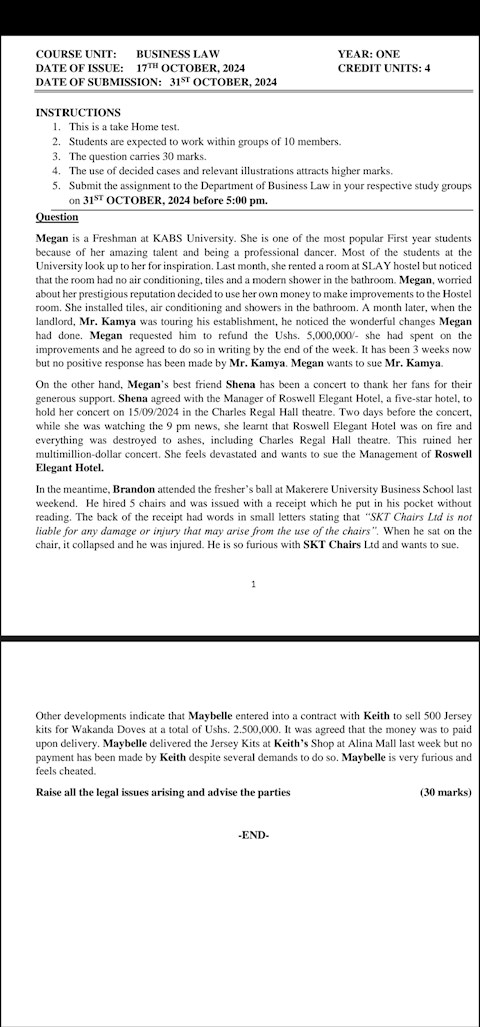2 answers
Sort By

ChatGPT
Oct 23, 2024
refers to the legal rules and regulations that govern business activities and transactions. It covers a wide range of topics, including contracts, intellectual property, employment law, and corporate governance. Business law is essential for ensuring that businesses operate within the boundaries of the law and that disputes are resolved in a fair and efficient manner. It also helps protect the rights of both businesses and consumers, and promotes a level playing field in the marketplace. Understanding and complying with business law is crucial for the success and sustainability of any business.
0

Google Gemini AI
Oct 23, 2024
Business Law
Definition:
The body of laws and regulations that govern business activities, transactions, and relationships.
Key Areas:
Contracts Law:
- Formation, performance, interpretation, and enforcement of contracts
- Types of contracts (e.g., sales, service, employment)
Business Organizations Law:
- Types of business entities (e.g., corporations, LLCs, partnerships)
- Formation, governance, and dissolution of businesses
Employment Law:
- Hiring, firing, employee rights, discrimination, wages, and benefits
Real Estate Law:
- Purchase, sale, and leasing of commercial and industrial property
Tax Law:
- Taxation of businesses, individuals, and transactions
- Federal, state, and local tax codes
Intellectual Property Law:
- Protection of trademarks, copyrights, patents, and trade secrets
Banking and Finance Law:
- Regulation of banks, lending, and investments
- Consumer protection laws
Government Regulation:
- Antitrust laws (e.g., Sherman and Clayton Acts)
- Environmental regulations (e.g., Clean Air Act, Clean Water Act)
- Consumer protection laws (e.g., Truth in Lending Act, Fair and Accurate Credit Transactions Act)
International Business Law:
- Import and export laws
- Foreign investment laws
- International trade agreements
Enforcement:
- Civil Courts: Resolve disputes between businesses or individuals
- Administrative Agencies: Enforce laws (e.g., FTC, SEC, EPA)
- Criminal Courts: Prosecute violations (e.g., fraud, embezzlement)
Importance of Business Law:
- Provides a framework for legal and ethical business practices
- Protects the rights of businesses and individuals
- Facilitates commerce and economic growth
- Helps businesses comply with regulatory requirements
- Minimizes legal liability and risk
Definition:
The body of laws and regulations that govern business activities, transactions, and relationships.
Key Areas:
Contracts Law:
- Formation, performance, interpretation, and enforcement of contracts
- Types of contracts (e.g., sales, service, employment)
Business Organizations Law:
- Types of business entities (e.g., corporations, LLCs, partnerships)
- Formation, governance, and dissolution of businesses
Employment Law:
- Hiring, firing, employee rights, discrimination, wages, and benefits
Real Estate Law:
- Purchase, sale, and leasing of commercial and industrial property
Tax Law:
- Taxation of businesses, individuals, and transactions
- Federal, state, and local tax codes
Intellectual Property Law:
- Protection of trademarks, copyrights, patents, and trade secrets
Banking and Finance Law:
- Regulation of banks, lending, and investments
- Consumer protection laws
Government Regulation:
- Antitrust laws (e.g., Sherman and Clayton Acts)
- Environmental regulations (e.g., Clean Air Act, Clean Water Act)
- Consumer protection laws (e.g., Truth in Lending Act, Fair and Accurate Credit Transactions Act)
International Business Law:
- Import and export laws
- Foreign investment laws
- International trade agreements
Enforcement:
- Civil Courts: Resolve disputes between businesses or individuals
- Administrative Agencies: Enforce laws (e.g., FTC, SEC, EPA)
- Criminal Courts: Prosecute violations (e.g., fraud, embezzlement)
Importance of Business Law:
- Provides a framework for legal and ethical business practices
- Protects the rights of businesses and individuals
- Facilitates commerce and economic growth
- Helps businesses comply with regulatory requirements
- Minimizes legal liability and risk
0
